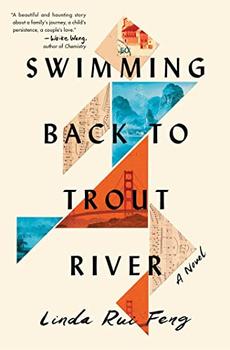Summary | Excerpt | Reviews | Beyond the Book | Readalikes | Genres & Themes | Author Bio

"Homeless because they set off all that dynamite in the cliffs," Junie said. She knew that this all led to the concrete-walled apartment they were living in now, and the train station too.
"We got all the neighbors out to look for him," Grandpa continued, "for hours."
Junie now held her breath for the best part.
"Then, before supper, someone spotted a rabbit hole in the fence, and if you squatted down and peered into it, there he was—"
"Asleep in our neighbor's garden!" It was Grandpa's turn to roll his eyes.
"With a small bunch of flowers in his hand," said Grandma, "and sunburned cheeks."
Junie released her breath, and a giggle came out with it. It was as if she reached into a hiding place for a favorite toy and found it was still there.
"Momo was too skinny for tiger food anyhow," she said. Junie expected Grandma to correct her, to tell her to use the proper address of "dad" instead. But this time all she said was, "Well, he was skinny, all right."
Grandma could not tell Junie that she hadn't expected Momo to survive his childhood. He was born, whimpering instead of bawling, into a world where Japanese bombs flattened buildings and turned electric wires into clotheslines for severed human limbs. What little hair he had on his crown was the color of dilute tea instead of the normal black. It was as if his hair exhausted itself just pushing out of his scalp, then simply gave up. Grandma knew that even hearty children were plucked off quickly in those years, and she didn't expect better odds for their sickliest-looking son. She delayed naming him for as long as they could, and then simply called him Momo, meaning "no hair."
On the day that the news of Japan's surrender reached them, a pernicious fever and dysentery was making an all-out assault on Momo's small body. All day he purged all the liquid inside him, his eyes shut against the world, until there seemed to be nothing left to purge. Neighbors came to them with the news of the war being over, but Grandma refused to be consoled that day. Thinking it was for the last time, she sat with Momo on a stool and called out his name. A temporary name for a borrowed child. Momo, Momo, Stinking-Momo, Pooping-Momo, she muttered over and over, rocking back and forth, while halfway across the world, confetti rained down onto the pavement as couples embraced and kissed.
Besides that fever and the scare with the tigers, Momo had other mishaps that—even in retrospect—brought a clenching to his mother's heart. Like that summer night when they slept on the roof and Momo rolled off the edge of it in his sleep. The house was low—nothing like the buildings they lived in now—but still.
Even by the time he took the name with him to school as his official name, now written with more dignified characters, she still touched him differently from the way she did her other sons. It was the kind of touch that was tender yet ready for a parting.
The family never took note of anyone's birthday—that is, apart from the beginning of each lunar year, when all the children were told they were now a year older. But the day Momo turned twelve, she beckoned him into the kitchen when the other boys were away, and handed him a small bowl of broth. It was an old tradition in those parts, though now mostly forgotten: soup of a small hen for a boy, a small rooster for a girl.
"You have to keep it a secret," she told him.
"Did something happen to one of our hens?" Momo leaned his face into the bowl. Ordinarily, chickens were too precious to be food.
"To mark a gateway in your life," she said. Then she added, "And because now I can stop worrying about you… growing up."
Momo's first mouthful made him squint, from the scalding temperature but also from the taste for which he had no words. She didn't know that well after the taste vanished from his tongue, he carried around the bright sustenance of the broth for days. As for the peculiar feeling of milestones, it stayed with him into his adolescence, adulthood, and eventually into his fatherhood, when he understood that a child's birthday was the most fleeting of milestones, when a parent could take the briefest recess on the long road of setting another life into motion.
.
Your guide toexceptional books
BookBrowse seeks out and recommends the best in contemporary fiction and nonfiction—books that not only engage and entertain but also deepen our understanding of ourselves and the world around us.